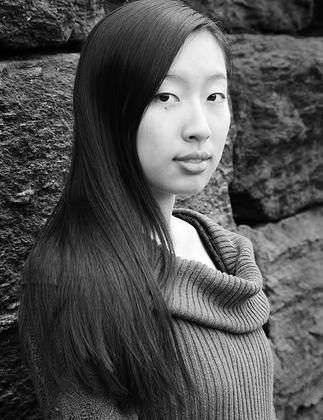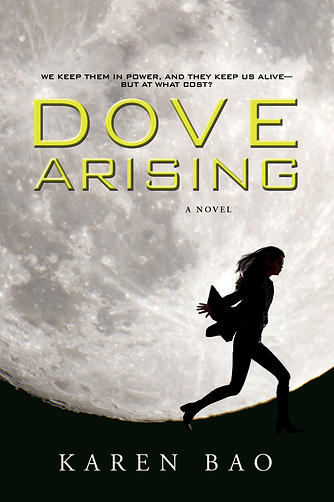 Karen Bao is the author of “Dove Arising.” The following is a complete transcript of her interview with Cracking the Cover.
Karen Bao is the author of “Dove Arising.” The following is a complete transcript of her interview with Cracking the Cover.
Have you always wanted to be a writer?
Nope! For a long time, I waffled between becoming a scientist and playing violin professionally. While I always loved reading books, I never thought I could actually write one. Then I tried it, and sort of learned as I went along. Writing was a lot harder than I expected.
Why write for young people?
Serious answer: young people are intelligent, sharp, and open to considering new ideas.
Not-so-serious answer: I haven’t really grown up yet (I sometimes eat cereal for every meal), so writing for adults would be a disaster.
Where do your ideas come from? Specifically the idea for Dove Arising?
My ideas come from life – I know, that’s too general to really be helpful, but it’s true. Dove Arising’s totalitarian government is based on Maoist China’s; since my mother grew up there, she told me stories about academic competition, resource scarcity, and her own father being sent to the countryside for “reeducation.” My ideas also come from class, nerdy as that sounds. For example, Phaet often outsmarts her enemies by manipulating the environment around her with concepts I learned in chemistry or physics class.
Why did you choose the moon as your setting?
The moon is so close to us, and yet it’s different from anything we know on earth. I wanted to take on the challenge of having people settle there – how would they meet their own biological needs? Also, the moon features prominently in cultures around the world, and I wanted to explore that. For example, in Chinese folklore, there’s a lonely woman with a pet rabbit living up there, and China’s second-biggest holiday is called the Moon Festival. In short, the moon interested me both scientifically and culturally: it was a playground for new ideas.
How did Phaet’s character come about?
In a surveillance state like the Moon, quiet people are “safer,” so I had my main character be almost completely silent. But Phaet’s introversion didn’t necessarily mean she’d be spineless – in fact, one of my best friends doesn’t talk much, and she’s one of the toughest people I know.
The biggest way in which Phaet resembles me is her deep appreciation for science. I think we should never stop questioning the universe. Although the Bases generally suck (for lack of a better word), their emphasis on discovery and innovation is on point.
 Elements of your book include science and military training. How much came from your imagination and how much research was involved?
Elements of your book include science and military training. How much came from your imagination and how much research was involved?
I consulted the Internet many, many times while drafting Dove Arising: when I picked out locations for the Bases, investigated the viability of weaponry, and learned my way around the gravitational “geography” of space that makes the Moon a strategic high ground. But I tried not to let fact-checking obstruct the story – after all, 200 years from now, who knows where technology and exploration will have taken us? For some aspects of the story, like the outlandish Lunar produce, I let my imagination run its course.
If you could choose between living on Earth or the moon, which would you choose?
Earth all the way! As a nature lover, I’d get bored on the Moon because it has no native organisms to study – I might even get freaked out by all the genetically engineered stuff the Lunars have come up with. Plus, the Moon has an authoritarian government, which doesn’t help their case.
What are you working on now?
Finishing the series, of course! That’s going right on schedule. After Book 3 is done, which will be around the time I graduate from college, I’ll take one or two years to write a fantasy book I’ve planned out in my head. It takes place in a completely new realm, which I built by drawing on the marine biology I’ve studied in school. I can’t wait to put the story down on paper.
Is there a book from your own childhood that still resonates with you? Why?
Tuck Everlasting by Natalie Babbit, about a family that can never die and the girl who grows to love them, will always have a place on my bookshelf. When I was seven or eight years old, the concept of death terrified me – until I read this book and realized that dying is just a bookend to living. I learned to appreciate each successive stage of life because I knew that it would never come back.
